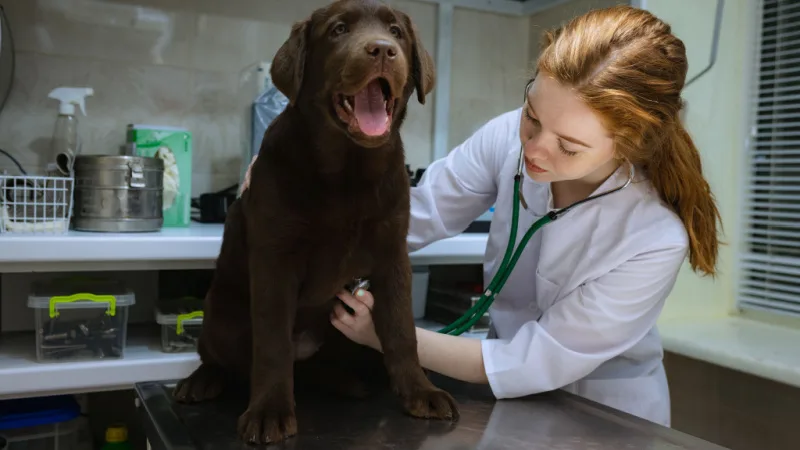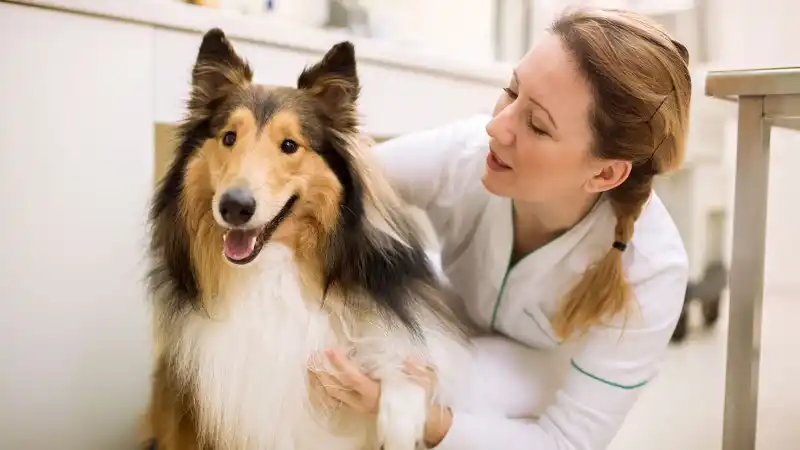Why You Need to Vaccinate Your Puppy
Vaccination is essential for keeping a puppy healthy. Here's when puppy vaccination should start, 3 core vaccines, and why you need to make vaccination a priority.

If you have a puppy, you know that there are so many things to think about when it comes to raising them in the healthiest, happiest way possible! It can be overwhelming to make decisions around diet, potty training, socializing, and basic behaviors, not to mention the important questions and decisions surrounding vaccination.
This is often an overlooked and misunderstood process, yet it is an extremely important part of your puppy’s early development and wellness plan. Let’s explore how your puppy gains immunity and protection against viruses starting just after birth, and how vaccinations add to this immunity to give them the safest start to a long and healthy life.
Nursing and Maternal Antibodies
After being born, healthy puppies will begin nursing within a few minutes. This is an essential step in their growth when their mother passes them the maternal antibodies they need to stay healthy prior to the development of their own immune system.
These maternal antibodies provide the puppies with protection against pathogens during their first few months of life and growth. The pre-milk fluid that they receive during the first 24-72 hours of nursing contains antibodies known as colostrum. After this period, the puppies will only receive milk. Colostrum also contains enzymes and growth factors that help the immature digestive and immune systems develop properly.
When Does Vaccination Start for Puppies?
The antibodies a puppy receives will provide protection from most viruses for about 7-9 weeks, and then protection begins to decline. Therefore, vaccines given during the first two months of life will not provide any long-lasting immunity as the maternal antibodies already circulating in the puppy’s system will remove most virus particles that were injected. This is why vaccine protocols typically start around 8-9 weeks, when the maternal antibodies begin to decrease, and the puppy’s immune system will need to respond to the vaccine by creating longer-lasting antibodies.
The presence of maternal antibodies is one reason that a series of vaccines is recommended, as most litters contain multiple puppies, and it is hard to say how much colostrum was ingested by each puppy and when exactly the antibodies received will decline. Commonly, a series of two to three vaccines separated 2-4 weeks apart is performed until the puppy is 16 weeks of age.
The Series of Vaccines a Puppy Should Receive
Let’s focus specifically on the vaccine that is done in a series and that all puppies must receive: the distemper, adenovirus (also called Hepatitis), parvovirus combination vaccine. It has many different acronyms such as DAP and DHP, and in some cases it may also contain parainfluenza virus (DHPP). This vaccine is considered a core vaccine, meaning all dogs should receive this vaccine, per the American Animal Hospital Association vaccine guidelines.
Distemper
Distemper virusis most commonly listed first, and it is a virus that is transmitted through the air from infected animals coughing. Once a dog is infected, it initially causes eye discharge, coughing, sneezing, fever, vomiting, diarrhea, and decreased appetite. Secondary bacterial infections can lead to pneumonia and, eventually, the virus will attack the central nervous system causing many neurologic symptoms (such as head tilt, circling, muscle tremors, or seizures). If left untreated and without veterinary supportive care, death may occur from the viral infection.
Adenovirus
Adenovirus has two types that cause different symptoms. There is canine adenovirus type 1 (CAV-1), and it can lead to severe liver inflammation (hepatitis) and failure. The other is CAV-2 and causes upper respiratory infections in dogs. Current combination vaccines have a variation of the CAV-2 virus and, fortunately, this will also provide protection against CAV-1.
Parvovirus
Parvovirusattacks and harms cells that are rapidly replicating in the body. In puppies, these are cells in the intestines and bone marrow. When these organs and tissues are compromised, it leads to severely dehydrating diarrhea and very low white blood cell counts, leaving the puppy vulnerable to secondary bacterial infections.
The virus is extremely hardy in the environment, lasting for long periods of time. Infected or carrier animals shed the virus through fecal matter. It is also resistant to most over-the-counter cleaners. The most problematic strain was first found in 1978 and caused significant illness and death as it spread. Fortunately, it has been a long time since parvovirus was initially discovered and vaccinations have evolved so that they can prevent almost all infections.
Other Vaccines for Puppies
There are many other vaccinations to consider for your puppy based on their lifestyle and region of the country.
Of course, rabies vaccination is required in the United States, and Bordetella, Leptospirosis, Lyme, and other vaccines may be appropriate too. You should really consult your primary veterinarian to determine which vaccines are considered important for your puppy.
Vaccination Is Essential to Keep Puppies Healthy
No matter where you live, the core combo vaccine discussed in this article is considered essential for your dog’s optimum safety and immune system development. The benefit of vaccination greatly outweighs the risk to your dog’s life if they become infected with these devastating diseases. Additionally, the cost of vaccination is much less that the cost of the hospitalization and medical care that is needed to treat dogs who become infected.
Dogs infected with parvovirus or distemper often need lengthy stays in an emergency veterinary hospital receiving IV fluids, antibiotics, and other treatment to compensate for the dehydration, to support the body as it fights for survival, and to help prevent secondary infections. They also need to stay in an isolated part of the hospital to minimize spread to other patients.
Adenovirus patients, especially the hepatitis virus, require isolated hospitalization and supportive care as well. Even when puppies survive these terrible diseases, they may have lasting problems from the disease for life. Make the smart decision and vaccinate your puppy so that they are protected against these harmful pathogens. If you are already on board with core vaccinations, then share this with a friend who may be skeptical or on the fence.
AKC Pet Insurance (underwritten by Independence American Insurance Company) offers an optional wellness coverage add-on that provides reimbursement for some puppy vaccinations and titers. Wellness coverage is not subject to waiting periods, coinsurance, deductible, or annual limit, and can be added to our base Accident and Illness plans.
If you want to learn more about wellness coverage or get a pet insurance quote, check out our quote tool or give us a call at 866-725-2747!
Dr. Preston Turano graduated from the University of Illinois College of Veterinary Medicine in 2002. Since that time, he has been a Veterinarian, Medical Director, and Practice Owner.
READ MORE ARTICLES

